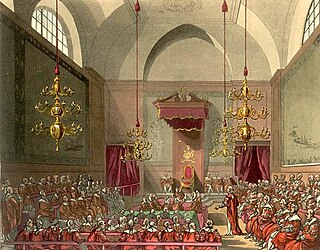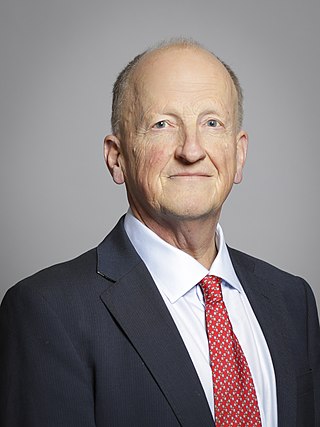Related Research Articles

The House of Lords is the upper house of the Parliament of the United Kingdom. Like the lower house, the House of Commons, it meets in the Palace of Westminster in London, England. One of the oldest institutions in the world, its origins lie in the early 11th century and the emergence of bicameralism in the 13th century.

The House of Commons is the lower house of the Parliament of the United Kingdom. Like the upper house, the House of Lords, it meets in the Palace of Westminster in London, England. The House of Commons is an elected body consisting of 650 members known as members of Parliament (MPs). MPs are elected to represent constituencies by the first-past-the-post system and hold their seats until Parliament is dissolved.

The Parliament of the United Kingdom of Great Britain and Northern Ireland is the supreme legislative body of the United Kingdom, and may also legislate for the Crown Dependencies and the British Overseas Territories. It meets at the Palace of Westminster in London. Parliament possesses legislative supremacy and thereby holds ultimate power over all other political bodies in the United Kingdom and the Overseas Territories. While Parliament is bicameral, it has three parts: the sovereign (King-in-Parliament), the House of Lords, and the House of Commons. In theory, power is officially vested in the King-in-Parliament. However, the Crown normally acts on the advice of the prime minister, and the powers of the House of Lords are limited to only delaying legislation; thus power is de facto vested in the House of Commons.

The Speaker of the House of Commons is the presiding officer of the House of Commons, the lower house and primary chamber of the Parliament of the United Kingdom. The current speaker, Sir Lindsay Hoyle, was elected Speaker on 4 November 2019, following the retirement of John Bercow. Hoyle began his first full parliamentary term in the role on 17 December 2019, having been unanimously re-elected after the 2019 general election.
A crossbencher is a minor party member of some legislatures, such as the British House of Lords and the Parliament of Australia. They take their name from the crossbenches, between and perpendicular to the government and opposition benches, where crossbenchers sit in the chamber.
The Co-operative Party is a centre-left political party in the United Kingdom, supporting co-operative values and principles. Established in 1917, the Co-operative Party was founded by co-operative societies to campaign politically for the fairer treatment of co-operative enterprise and to elect 'co-operators' to Parliament. The party's roots lie in the Parliamentary Committee of the Co-operative Union established in 1881.

Bruce Bernard Weatherill, Baron Weatherill, was a British Conservative Party politician. He served as Speaker of the House of Commons between 1983 and 1992.
In the United Kingdom, life peers are appointed members of the peerage whose titles cannot be inherited, in contrast to hereditary peers. Life peers are appointed by the monarch on the advice of the prime minister. With the exception of the Dukedom of Edinburgh awarded for life to Prince Edward in 2023, all life peerages conferred since 2009 have been created under the Life Peerages Act 1958 with the rank of baron and entitle their holders to sit and vote in the House of Lords, presuming they meet qualifications such as age and citizenship. The legitimate children of a life peer appointed under the Life Peerages Act 1958 are entitled to style themselves with the prefix "The Honourable", although they cannot inherit the peerage itself. Prior to 2009, life peers of baronial rank could also be so created under the Appellate Jurisdiction Act 1876 for senior judges.

Michael John Martin, Baron Martin of Springburn, was a Scottish politician who served as Speaker of the House of Commons between 2000 and 2009. A member of the Labour Party, he was the Member of Parliament (MP) for Glasgow Springburn from 1979 to 2005 and for Glasgow North East until 2009. He was elected as Speaker of the House of Commons in 2000, remaining in the office for nine years until his involuntary resignation in 2009.

The Lord Speaker of the House of Lords is the presiding officer, chairman and highest authority of the House of Lords in the Parliament of the United Kingdom. The office is analogous to the Speaker of the House of Commons: the Lord Speaker is elected by the members of the House of Lords and is expected to be politically impartial.

The reform of the House of Lords, the upper house of the Parliament of the United Kingdom, has been a topic of discussion in UK politics for more than a century. Multiple governments have attempted reform, beginning with the introduction of the Parliament Act 1911 by the incumbent Liberal Government, which stated:
...whereas it is intended to substitute for the House of Lords as it at present exists a Second Chamber constituted on a popular instead of hereditary basis, but such substitution cannot be immediately brought into operation

Valerian Bernard Freyberg, 3rd Baron Freyberg is a British hereditary peer, who sits in the House of Lords as a crossbencher.
By-elections to the House of Lords occur when vacancies arise among seats assigned to hereditary peers due to death, resignation, or disqualification. Candidates for these by-elections are limited to holders of hereditary peerages, and their electorates are made up of sitting Lords; in most cases the electorate are those sitting hereditary peers of the same party affiliation as the departed peer.

All-Party Groups (APGs) within United Kingdom politics are informal, cross-party, interest groups of the UK Parliament. APGs have at least 20 members who are all Members of the House of Commons and House of Lords. The All-Party Parliamentary Humanist Group (APPHG) is a subject group of the APG whose purpose is to bring together non-religious humanist, atheist and agnostic MPs and peers to discuss matters of shared interest.

Godfrey John Bewicke-Copley, 7th Baron Cromwell, is a British hereditary peer and member of the House of Lords, sitting as a crossbencher.

His Majesty's Most Loyal Opposition, commonly known as the Official Opposition in the United Kingdom, is the main political opposition to His Majesty's Government. This is usually the political party with the second-largest number of seats in the House of Commons, as the largest party will usually form the government. Since May 2010, the Official Opposition has been the Labour Party, led by Keir Starmer since 2020.
On 28 August 2019, the Parliament of the United Kingdom was ordered to be prorogued by Queen Elizabeth II on the advice of the Conservative prime minister, Boris Johnson – this advice was later ruled unlawful. The prorogation, or suspension, of Parliament was to be effective from some point between 9 and 12 September 2019 and would last until the State Opening of Parliament on 14 October 2019. As a consequence, Parliament was suspended between 10 September and 24 September 2019. Since Parliament was to be prorogued for five weeks and reconvene just 17 days before the United Kingdom's scheduled departure from the European Union on 31 October 2019, the move was seen by many opposition politicians and political commentators as a controversial and unconstitutional attempt by the prime minister to avoid parliamentary scrutiny of the Government's Brexit plans in the final weeks leading up to Brexit. Johnson and his Government defended the prorogation of Parliament as a routine political process that ordinarily follows the selection of a new prime minister and would allow the Government to refocus on a legislative agenda.
References
- ↑ "Ineligible Non-affiliated members of the House of Lords". UK Parliament.
- ↑ "The party system". UK Parliament.
MPs and Members of the Lords do not have to belong to a political party. Instead, MPs can sit as Independents and Lords can sit as Crossbenchers or Independents.
- ↑ "The Lord Speaker". UK Parliament.
- ↑ "Non-affiliated members of the House of Lords". UK Parliament.
- ↑ "Three Labour peers quit over handling of antisemitism cases". The Guardian. 9 July 2019.
- ↑ "Oakeshott quits Lib Dems with Clegg 'disaster' warning". BBC News. 28 May 2014.
- ↑ "Lord Paddick to join the Metropolitan Police as a Non Executive Advisor". libdemvoice.org. 10 October 2023.
- ↑ "Labour peer suspended over sexual harassment and transphobia". The Guardian. 23 October 2019.
- ↑ ""Party distances itself from Maginnis gay marriage remarks"". BBC News. 13 June 2012. Retrieved 29 December 2016.
- ↑ Eaton, George (2 March 2014). "David Owen joins Miliband's big tent with donation to Labour of more than £7,500". New Statesman. Retrieved 30 December 2016.
- ↑ "Former Conservative peer Lord Stevens to join UK Independence Party". BBC News. BBC. 18 September 2012. Retrieved 18 September 2012.